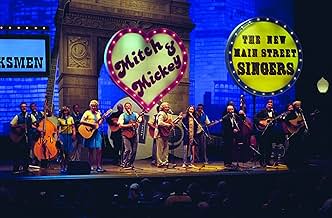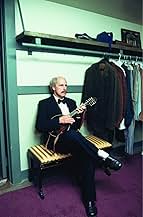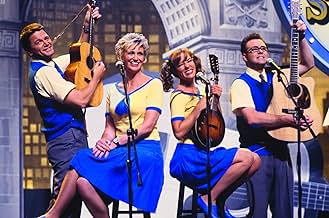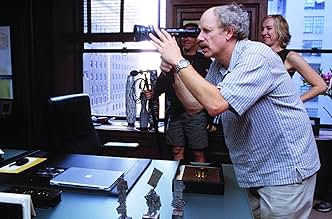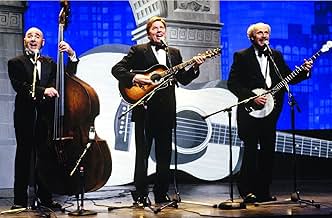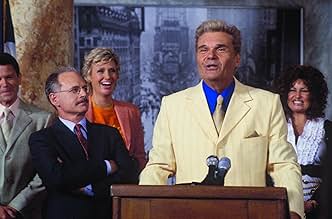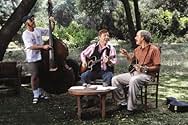Mockumentary captures the reunion of 1960s folk trio the Folksmen as they prepare for a show at The Town Hall to memorialize a recently deceased concert promoter.Mockumentary captures the reunion of 1960s folk trio the Folksmen as they prepare for a show at The Town Hall to memorialize a recently deceased concert promoter.Mockumentary captures the reunion of 1960s folk trio the Folksmen as they prepare for a show at The Town Hall to memorialize a recently deceased concert promoter.
- Director
- Writers
- Stars
- Nominated for 1 Oscar
- 14 wins & 28 nominations total
Marty Belafsky
- Ramblin' Sandy Pitnik
- (as Marty Belasky)
Michael S. Baser
- Pa Klapper
- (as Michael Baser)
- Director
- Writers
- All cast & crew
- Production, box office & more at IMDbPro
Featured reviews
Some felt that this was too close to reality to be considered a parody, but I thought it was beautifully done - made fun of the cloying smugness of some "folkies", but mixed it with genuine pathos. I have a feeling Eugene Levy may have lost a couple of friends to bad acid trips - his portrayal was hilarious, but not cruel. Christopher Guest continues to amaze me with his light touch; most comedies put people in bad situations and make them squirm their way through; instead Guest takes apparently mediocre characters and puts them in situations that stretch their personalities.
Contains the single funniest comment I've ever heard about model trains.
Suggested double feature: This is Spinal Tap, Waiting for Guffman, or Bob Roberts
Contains the single funniest comment I've ever heard about model trains.
Suggested double feature: This is Spinal Tap, Waiting for Guffman, or Bob Roberts
Christopher Guest's movies, like his performances, are generally subtle and always low-key. They are not for people who need laugh tracks to follow the humor and most of his work is so contextually-based that some knowledge of the subject he's dissecting is a definite asset. Guest, who was a performer in the very early SATURDAY NIGHT LIVE, is, in many respects, the Anti-Belushi of modern American comedy.
Nevertheless, he shares with Belushi - and many of their contemporaries, who came from one or another branch of the Second City organization - a certain fondness for off-the-wall elements in his work; Guest's tend to be slipped in, quietly, while Belushi's popped out of exploding cakes.
A MIGHTY WIND is a spot-on satire of the American Folk Music movement of the early and mid-1960s. The narrative conceit is a memorial concert for a recently deceased impressario, organized by his son, which reunites three folk groups from the 60s.
The real elements of the film are the send-ups of a variety of tropes of the era, musical styles, personalities, and quite an array of music-business cliches. Remarkably, however, the songs are genuinely entertaining in themselves; both the writing and the performances. They're satirical, but so subtlely performed that it's easy to loose the thread of the lyrics and wind up mindlessly nodding heads and grooving along, which pretty neatly captures the popular music experience for the last several generations. Satire within satire.
The musical performances are excellent, recreating, almost frighteningly, the taste and texture of folk music of the era. And, bringing several real 60s folk acts to mind.
The acting is typical of Guest movies, such as SPINAL TAP and BEST IN SHOW; very quiet, restrained, low-key, with, apparently, a lot of dialogue improvised. The performers are mostly drawn from the same group Guest has used in the past: Eugene Levy (who co-wrote the script with Guest) and Catherine O'Hara, Harry Shearer, Michael McKean, Ed Begley, Jr., and Guest, himself.
Comparisons with Guest's most popular picture, THIS IS SPINAL TAP are both interesting and tricky. Interesting because both movies were written and directed by the same man, and shared most of the same casts. Tricky, because while some seem to compare AMW unfavorably with TIST, a looking at these films, together, they have a lot in common. So much so, in fact, that it's reasonable to consider them a pair; very similar takes on two, distinct musical genres of a similar era. The writing, acting, tone, pacing of these two movies is very similar. The jokes are similar. The points of view are similar. The focus on both performers, and the behind-the-scenes people is similar. The real difference is the music.
This, in turn, tends to suggest that those who react very differently to these two films may be reacting more to the music, directly, and to the ambiance of the world around the particular musical genre more than anything else.
Guest's movies don't have many laugh-out-loud moments. Most of the humor is more the "big-smile", sometimes, the chuckle, kind. But, Ed Begley, Jr. has perhaps his best comic scene, ever, when he does a take as a Swedish-American public television producer dropping Yiddish into his conversation; one word per sentence. It's a totally dead-pan and very quiet performance which, like so much of Christopher Guest's humor, you will either get or not get. If you do, you may fall off your chair.
Eugene Levy, who co-wrote the script, with Guest, is also very good, having finally invented a second character after having spent something more than 30 years (since his Second City TV days) doing variations of one.
Who might enjoy A MIGHTY WIND? Anyone who remembers the era and the music, and anyone who enjoys show business insider takes. It's a more difficult call for those born later. And, if you have trouble keeping Janis Joplin and Joanie Mitchell distinct in your mind, you probably won't follow most of what's going on.
Nevertheless, he shares with Belushi - and many of their contemporaries, who came from one or another branch of the Second City organization - a certain fondness for off-the-wall elements in his work; Guest's tend to be slipped in, quietly, while Belushi's popped out of exploding cakes.
A MIGHTY WIND is a spot-on satire of the American Folk Music movement of the early and mid-1960s. The narrative conceit is a memorial concert for a recently deceased impressario, organized by his son, which reunites three folk groups from the 60s.
The real elements of the film are the send-ups of a variety of tropes of the era, musical styles, personalities, and quite an array of music-business cliches. Remarkably, however, the songs are genuinely entertaining in themselves; both the writing and the performances. They're satirical, but so subtlely performed that it's easy to loose the thread of the lyrics and wind up mindlessly nodding heads and grooving along, which pretty neatly captures the popular music experience for the last several generations. Satire within satire.
The musical performances are excellent, recreating, almost frighteningly, the taste and texture of folk music of the era. And, bringing several real 60s folk acts to mind.
The acting is typical of Guest movies, such as SPINAL TAP and BEST IN SHOW; very quiet, restrained, low-key, with, apparently, a lot of dialogue improvised. The performers are mostly drawn from the same group Guest has used in the past: Eugene Levy (who co-wrote the script with Guest) and Catherine O'Hara, Harry Shearer, Michael McKean, Ed Begley, Jr., and Guest, himself.
Comparisons with Guest's most popular picture, THIS IS SPINAL TAP are both interesting and tricky. Interesting because both movies were written and directed by the same man, and shared most of the same casts. Tricky, because while some seem to compare AMW unfavorably with TIST, a looking at these films, together, they have a lot in common. So much so, in fact, that it's reasonable to consider them a pair; very similar takes on two, distinct musical genres of a similar era. The writing, acting, tone, pacing of these two movies is very similar. The jokes are similar. The points of view are similar. The focus on both performers, and the behind-the-scenes people is similar. The real difference is the music.
This, in turn, tends to suggest that those who react very differently to these two films may be reacting more to the music, directly, and to the ambiance of the world around the particular musical genre more than anything else.
Guest's movies don't have many laugh-out-loud moments. Most of the humor is more the "big-smile", sometimes, the chuckle, kind. But, Ed Begley, Jr. has perhaps his best comic scene, ever, when he does a take as a Swedish-American public television producer dropping Yiddish into his conversation; one word per sentence. It's a totally dead-pan and very quiet performance which, like so much of Christopher Guest's humor, you will either get or not get. If you do, you may fall off your chair.
Eugene Levy, who co-wrote the script, with Guest, is also very good, having finally invented a second character after having spent something more than 30 years (since his Second City TV days) doing variations of one.
Who might enjoy A MIGHTY WIND? Anyone who remembers the era and the music, and anyone who enjoys show business insider takes. It's a more difficult call for those born later. And, if you have trouble keeping Janis Joplin and Joanie Mitchell distinct in your mind, you probably won't follow most of what's going on.
We have a duo, a trio, and a group of 9. These three fictitious 'folk' groups from the 60s reunite for a concert in this mockumentary. What makes it so interesting is (1) I was a young adult in the 60s and vividly remember the folk group wave and (2) Guest, Levy and the others do their own singing and playing of songs they wrote for the movie. I think its IMDb ratings which cluster around 7 and 8 are about right. Not everyone will like 'A Mighty Wind' (song from final concert), it has improvised humor and many of the same actors from 'Best in Show'. But for fans of the humor of Guest and Levy it is a very nice little movie. The DVD has interesting extras, and the commentary track by Guest and Levy discuss how, for example, Levy had to take lessons to get is guitar skills back, and how O'Hara learned to play the autoharp for this role.
The movie is 92 minutes long, which includes the 7 minutes of end credits. Of the 85 minutes of actual movie, the first 60 sets up the characters and groups, shows them in rehearsals, covers several back stories, then the final 25 minutes are the concert itself, actually performed before a live audience. There were a few truly outstanding folk groups in the 1960s, but there also were a whole bunch of mediocre ones. The three groups featured in this movie are as good as many of the 1960s groups that actually made a living entertaining. And, as at least one critic said, that's part of the problem with 'A Mighty Wind' - the groups are good enough, and the final concert is real enough, that much of the impact of the humor went away during the last act. The lampooning was gone, replaced by a legitimate set of performances.
Still, I found it thoroughly enjoyable, and my favorite of the 'Guest/Levy' movies.
The movie is 92 minutes long, which includes the 7 minutes of end credits. Of the 85 minutes of actual movie, the first 60 sets up the characters and groups, shows them in rehearsals, covers several back stories, then the final 25 minutes are the concert itself, actually performed before a live audience. There were a few truly outstanding folk groups in the 1960s, but there also were a whole bunch of mediocre ones. The three groups featured in this movie are as good as many of the 1960s groups that actually made a living entertaining. And, as at least one critic said, that's part of the problem with 'A Mighty Wind' - the groups are good enough, and the final concert is real enough, that much of the impact of the humor went away during the last act. The lampooning was gone, replaced by a legitimate set of performances.
Still, I found it thoroughly enjoyable, and my favorite of the 'Guest/Levy' movies.
An excellent entertainment, though very different from this ensemble's other pseudo-documentary efforts (Spinal Tap, Best in Show).
Incredibly creative. I'm a fan of folk music and this film really nails the eclectic backgrounds of folk musicians, right down to the distinctive vocalizations, multi-line harmonies and excessive enthusiasm. I was so impressed that all the parodied songs were written and performed (well) by the actors and I now covet the sound track. Get ready for a lot of subtle humor and story lines and enjoy the send-up.
Incredibly creative. I'm a fan of folk music and this film really nails the eclectic backgrounds of folk musicians, right down to the distinctive vocalizations, multi-line harmonies and excessive enthusiasm. I was so impressed that all the parodied songs were written and performed (well) by the actors and I now covet the sound track. Get ready for a lot of subtle humor and story lines and enjoy the send-up.
It's of course hilarious, but it's also his only mockumentary with real heart, and boy does it work. O'Hara and Levy lean on their decades of natural chemistry to make their post-romance relationship both gut-bustingly funny and sensibly sad. All three of the groups are uniquely perfect, and their musical performances are inspired. And if anyone wonders what made Fred Willard so beloved, just watch his tour de force introduction in this movie...it's everything.
Did you know
- TriviaIn an early-'90s, and again in late 90's/ early 2000's, Spinal Tap tour, Michael McKean, Harry Shearer and Christopher Guest opened for themselves as The Folksmen and were booed during the first act, as people did not know or cared that the two bands had the same musicians.
- GoofsWhen the New Main Street Singers are playing at the reunion concert, members of the band move around between shots.
- Quotes
Terry Bohner: There was abuse in my family, but it was mostly musical in nature.
- Crazy creditsAt the end of the film, before the traditional scrolling credits, the screen is filled with all the main actors' names. One at a time, each star's name is highlighted, in alphabetical order. The scrolling credits are in order of appearance.
- Alternate versions2003 DVD version uses the film's WB and Castle Rock logos with "An AOL Time Warner company" (along with WB distribution card at end). The 2016 Warner Archive Blu-ray keeps the logos roughly the same, but with slightly updated versions losing the AOL designation. (The trailer included on it retains the original AOL Time Warner logos from 2003.)
- ConnectionsFeatured in The 2004 IFP/West Independent Spirit Awards (2004)
- SoundtracksOld Joe's Place
Written by Christopher Guest, Harry Shearer and Michael McKean
Performed by The Folksmen
- How long is A Mighty Wind?Powered by Alexa
Details
- Release date
- Country of origin
- Official site
- Languages
- Also known as
- American Folk Story
- Filming locations
- Production company
- See more company credits at IMDbPro
Box office
- Gross US & Canada
- $17,781,006
- Opening weekend US & Canada
- $2,112,140
- Apr 20, 2003
- Gross worldwide
- $18,750,246
- Runtime1 hour 31 minutes
- Color
- Sound mix
- Aspect ratio
- 1.85 : 1
Contribute to this page
Suggest an edit or add missing content








